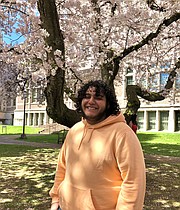Coding the future: Wahluke High School students qualify for FBLA nationals
MATTAWA — Two Wahluke High School students will advance to the Future Business Leaders of America (FBLA) national competition after placing in the top four in state competition. And, a team from WHS placed seventh in the state video game competition.
Junior Roberto Santos qualified for nationals in the Insurance and Risk Management competition and junior Audiel Mendez will compete in the Cyber Security category. Both finished fourth. Santos teamed with Angel Torres to finish seventh in video game design, with an entry they developed in the video game programming class at Columbia Basin Technical Skills Center.
Mendez said this is his third year in FBLA competition. He felt pretty good about qualifying for nationals, he said, especially looking back on his progress. In his freshman year, he didn’t make the top 10, he said.
Adviser Isa Olivia Holsclaw said participants are quizzed on the risk management process, which includes different kinds of insurance, decision-making, careers and ethics, among other things. Santos was a little vague about the insurance category, saying he didn’t remember much of what it was about.
The cyber security competition tests students on their knowledge of computer security techniques, including defending networks, detecting intruders, security policy and recovering from an attack.
She also said the students who qualified for nationals will be tested virtually in their disciplines during the week of June 7. Winners will be announced during the national convention in late June.
“All I had to do was study, basically,” Mendez said.
The test was pretty difficult, he said. It quizzed him on his knowledge of different software applications, he said, such as how to know if there’s been an attack, and a number of other details.
He’ll be competing against FBLA members from all over the country, but Mendez said he thinks he’s got a good chance to place fairly high.
“I think I’ll do fine. I don’t think I’ll win, but I think I’ll do fine,” he said.
The game designers had some specifications to meet.
“It had to be a puzzle-type game,” Torres said. “It had to include (character) lives, scores and a bunch of other things. The way that we implemented the puzzle aspect of the game was that we made the levels like mazes that you had to solve to get to the end goal.”
They chose a two-dimensional game, making it reminiscent of Super Mario Bros. and designed it with a specific audience in mind.
“We were trying to make it a little bit retro, hit it over with the judges, because usually the judges are older age,” Torres said.
He’s participated in other competitions, and noticed the judges would respond to designs that looked familiar.
“We kind of took advantage of that,” Torres said. “Not only that, everyone gets nostalgic when they’re playing really old games.”
Santos and Torres were relatively new to game design.
“We were pretty inexperienced in that field,” Torres said.
It was, Santos said, his first year coding. Torres did a lot of the coding for his robotics team, but in different languages, so they had to catch up and do most of it on their own.
“Research. We researched a bunch of things, learned how to do different things,” Torres said.
Video game programming requires attention to every little detail, since every single action in the game requires coding. Whether a character is moving, how a character moves, as well as how a character progresses through a game, it requires underlying instruction from the programmer.
“We broke it into parts of what we wanted to get done,” Torres said.
Torres started on the design, while Santos worked on the coding. As they progressed they split the duties so each was doing about half the coding and design. Building the game took about three months, Santos said. Game design had to be sandwiched in with other coursework and sports. The process was further complicated by the commute from Mattawa to the technical skills center.
In the end, they were relatively satisfied with the results.
“Kind of,” Santos said.
“There were definitely ways where we could’ve made major improvements,” Torres said.
“If we had more time,” Santos said.
“And more experience,” Torres said.
“That would’ve been helpful,” Santos said.
With the limitations, they were a little surprised to finish seventh, Santos said.
“We could’ve done better,” Torres said. “For sure.”
Cheryl Schweizer can be reached via email at [email protected].



